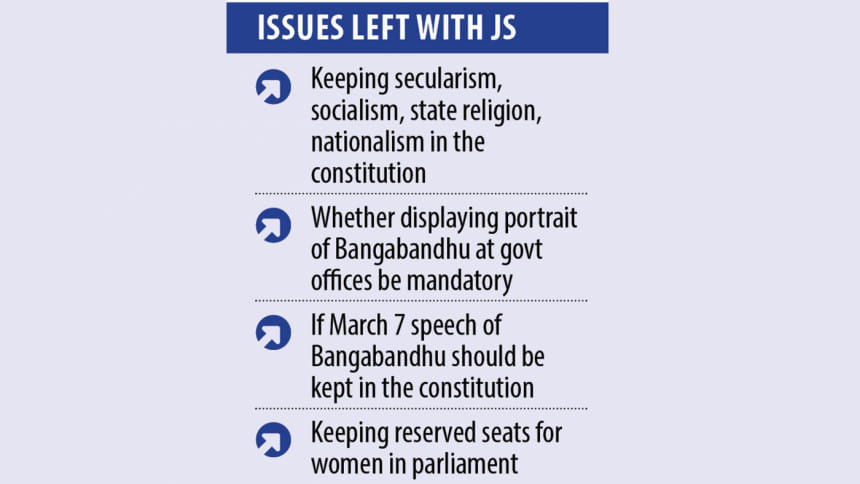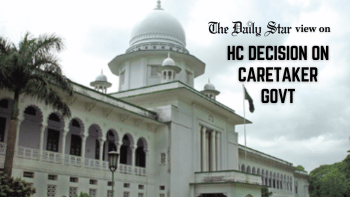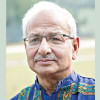15Th amendment to constitution: HC scraps part that abolished caretaker system

In a landmark verdict, the High Court yesterday scrapped a part of the 15th amendment to the constitution that abolished the non-partisan caretaker government system.
The verdict removes an obstacle to reintroducing the system for holding parliamentary elections.
The court also restored the provision for holding referendums for amending the constitution.
The abolition of the non-partisan caretaker government system has destroyed democracy, the process of free and fair elections, independence of the judiciary and the sovereignty of people, which are the basic structures of the constitution, observed the HC bench of Justice Farah Mahbub and Justice Debasish Roy Chowdhury.
Delivering the verdict on two writ petitions, the bench also said the Appellate Division of the Supreme Court will make the final decision about the restoration of the caretaker government system as review petitions on a verdict on the amendment are pending with the apex court.
Attorney General Md Asaduzzaman, however, believes the next two polls can be held under caretaker governments even if review petitions remain pending with the Appellate Division.
A full bench of the Appellate Division is scheduled for January 19 to hear three review petitions that challenge a 2011 verdict that scrapped the system. The BNP, Jamaat-e-Islami, and five citizens lodged the petitions.
After the verdict was delivered yesterday, Mohammad Shishir Manir, a lawyer for Jamaat, told The Daily Star, "The parliament has to pass a law in line with the judgment. Since there is no parliament now, the government may pass an ordinance."
Contacted, eminent lawyer Shahdeen Malik said, "Reviving the caretaker government system certainly reflects people's expectations.
"Articles 7A and 7B [abolished yesterday] were in conflict with the constitution, so it was expected that these would be declared unconstitutional. Bringing back the provision for a referendum is also a welcome decision.
"Overall, everyone would be happy with the judgment. It will pave the way for a more democratic Bangladesh."
Citing writ petitions and lawyers' arguments, the HC bench led by Justice Farah Mahbub observed that after the caretaker government system was abolished, the country saw three consecutive elections that did not reflect the will of the people and led to the July uprising, the HC said.
The bench observed that the 13th amendment introduced the caretaker government system in 1996 to ensure free and fair election and to strengthen democracy, and therefore, the 13th amendment became part of the basic structure of the constitution.
The Appellate Division in its judgment on the 13th amendment had asked for holding two national elections (10th and 11th) under the caretaker government system, but after the 15th amendment, those elections were held under partisan governments.
On June 30, 2011, the Jatiya Sangsad passed the 15th amendment. With that, Islam's status as the state religion was retained and "Bismillahir Rahmanir Rahim" with its translation "In the name of Allah, the Beneficent, the Merciful/ In the name of the Creator, the Merciful" became a part of the constitution.
The amendment also introduced the provisions for holding parliamentary polls within 90 days before a parliament's tenure ends; gave more powers to the war crimes tribunal; and made it mandatory to display the portrait of Father of the Nation Sheikh Mujibur Rahman at all government offices.
The historic speech of Sheikh Mujibur Rahman on March 7, 1971, was placed in the fifth schedule of Bangladesh Constitution through the 15th amendment.
Yesterday, the HC bench also struck down articles 7 (A), 7 (B), 44(2) and 58A of the constitution, declaring them void and unconstitutional.
Article 7(A) of the constitution is regarding the use of force and other unconstitutional means to "abrogate, repeal or suspend" the constitutions or any of its articles.
Article 7(B) makes certain parts of the constitution unamendable "by way of insertion, modification, substitution, repeal or by any other means".
Article 44(2) says, "Without prejudice to the powers of the High Court Division under article 102, parliament may by law empower any other court, within the local limits of its jurisdiction, to exercise all or any of those powers."
In the judgement yesterday, the HC bench said even though article 142 of the 12th amendment ensured the provision for referendums, it was abolished by the 15th amendment.
The HC reinstated article 142, saying its scrapping went against the basic structure of the constitution.
In the verdict, the HC said a total of 54 changes, modifications, and substitutions have been brought to the constitution through the 15th amendment.
The court did not delve into other provisions of the 15th amendment that deal with state principles, including secularism, socialism, state religion, nationalism; the issues of displaying the portrait of father of the nation, historic speech of Bangabandhu Sheikh Mujibur Rahman on March 7, 1971; increasing the number of reserved seats for women in parliament from 45 to 50; protection and development of culture and tradition of the tribes, minor races, ethnic sects and communities; protection and improvement of environment and biodiversity; and article 116 of the constitution regarding presidential control over lower court discipline.
The future parliament will decide on these issues on the basis of people's opinions, said Justice Farah Mahbub.
Article 116 says: "The control (including the power of posting, promotion and grant of leave) and discipline of persons employed in the judicial service and magistrates exercising judicial functions shall vest in the President and shall be exercised by him in consultation with the Supreme Court."
The HC bench said it would not say anything about article 116 as a rule questioning its constitutionality was pending with the court.
The court also clarified that the interim government is not a caretaker government.
It said the current government is different as it was formed by the president after he sought the opinion of the Appellate Division under article 106 of the constitution.
Article 106 says, "If at any time it appears to the President that a question of law has arisen, or is likely to arise, which is of such a nature and of such public importance that it is expedient to obtain the opinion of the Supreme Court upon it, he may refer the question to the Appellate Division for consideration and the division may, after such hearing as it thinks fit, report its opinion thereon to the President."
Replying to a question, Attorney General Asaduzzaman, however, said the interim government can be renamed a caretaker government as the Appellate Division has given legitimacy to this government.
"For example, the district judges are termed as district judges when they deal with civil cases and the same judges are termed as district and sessions judges when they deal with the criminal cases. In the same way, when the persons of this interim government will function for the caretaker government the government will be termed caretaker government," the attorney general said.
The HC earlier heard arguments on the three petitions for 12 working days.
One of the writ petitions was filed by Mofazzal Hossain, a freedom fighter from Narayanpara of Naogaon.
On October 19, the HC bench issued a rule asking the government to explain why the 15th amendment should not be declared unconstitutional. It also questioned why actions taken under the amendment should not be invalidated.
On August 19, another HC bench led by Justice Naima Haider, now on leave, issued a similar rule following a writ petition filed by five Badiul Alam Majumdar, Tofail Ahmed, M Hafizuddin Khan, Md Jobirul Hoque Bhuiyan, and Zahrah Rahman.
Apart from them and the state, a few political parties, including the BNP, Jamaat, Gono Forum, and some SC lawyers placed arguments before the HC against the 15th amendment.
LAWYERS' REACTIONS
After the HC delivered the judgment yesterday, Attorney General Md Asaduzzaman demanded the trial of former chief justices ABM Khairul Haque and Syed Mahmud Hossain for their role in abolishing the caretaker government system.
He said, "They ruined the judiciary. They must be punished."
Briefing the press at his office, Asaduzzaman said a seven-member bench led by Justice ABM Khairul Haque announced that the caretaker system was unconstitutional, but two more elections could be held under such a government.
"But 16 months later, he reversed his judgment when parliament amended the constitution omitting the caretaker government system," he said, adding that Justice Syed Mahmud Hossain supported Justice ABM Khairul Haque.
He said Justice Mahmud was instrumental in the destruction of the judiciary.
Due to the judges' roles, he said, democracy was exiled, crimes against humanity and enforced disappearances happened, and cases were filed against dead people.
The attorney general said it is possible to conduct the next two elections under the caretaker government system even if review petitions remain pending with the Appellate Division.
"There were two parts of Khairul Haque's judgment. One was about whether the caretaker government was legal or illegal. In that part, there was a divided judgment, but there was no disagreement among judges on the issue of conducting the next two elections under caretaker government," he added.
Quoting the HC observation, Sharif Bhuiyan, principal lawyer for a writ petitioner, said as democracy and elections are basic structures of the constitution, the caretaker government system became a part of it.
"We filed a review petition on the judgment of Justice Khairul Haque with the Appellate Division which is pending and scheduled for a hearing in the third week of January. If the Appellate Division delivers a verdict in our favour, only then we would be able to say the caretaker government system has been restored," he said.
BNP's Vice-Chairman Zainul Abedin said, "People's will is the basis for changing the constitution, but the previous government did not bother with the people's will while making the 15th amendment. They made the amendment by putting pressure on the court."
Barrister Kaiser Kamal said, "The 15th amendment was the final solution for the Awami League to stay in power and for Sheikh Hasina to stay as prime minister forever."
Lawyer Mohammad Shishir Manir said, "Democracy is the basic structure of our constitution, and the court said the caretaker government also became a basic structure of the constitution since it is not possible to conduct free, fair and impartial elections without such a government."


 For all latest news, follow The Daily Star's Google News channel.
For all latest news, follow The Daily Star's Google News channel. 










Comments